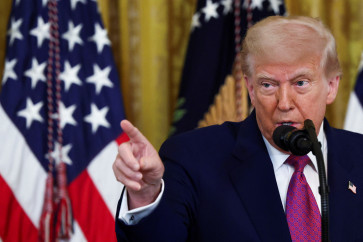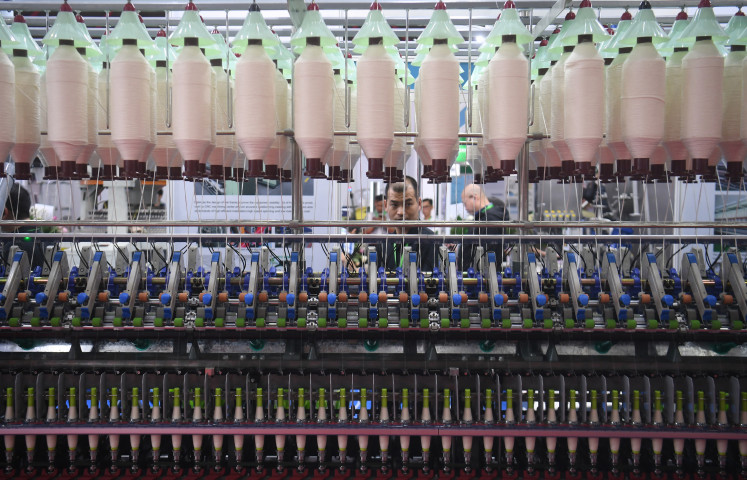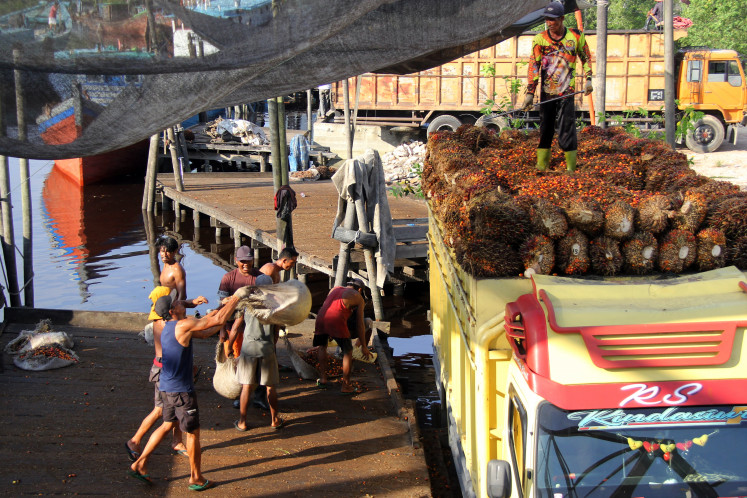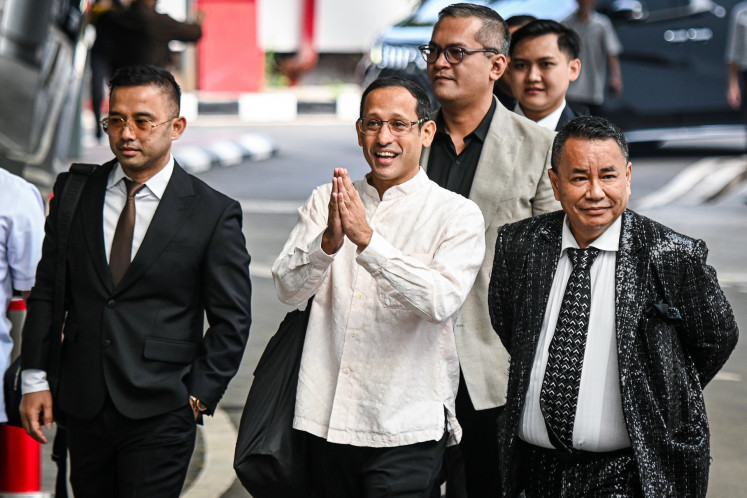Popular Reads
Top Results
Can't find what you're looking for?
View all search resultsPopular Reads
Top Results
Can't find what you're looking for?
View all search resultsAfter hectic year, calm 2020 expected
Bright future ahead: A view of the capital is seen from a high-rise building in South Jakarta at sunset on Monday as Jakartans prepare to bid farewell to 2019
Change text size
Gift Premium Articles
to Anyone
B
right future ahead: A view of the capital is seen from a high-rise building in South Jakarta at sunset on Monday as Jakartans prepare to bid farewell to 2019. (JP/Dionnasius Aditya)
After a hectic year of general elections, series of protests and political maneuvers that sparked debates and divided the country, many are hoping that 2020 would bring stability and a positive outlook.
Indonesia witnessed its most divisive presidential election that split voters between President Joko “Jokowi” Widodo’s predominantly nationalist base and Prabowo Subianto’s conservative Muslim supporters. The battle was not only in the political and national arena as arguments frayed relations between friends and families.
However, citizens can expect less fuss in the political sphere in 2020 as at the end of the decade Jokowi made moves that accommodated many of his political supporters, as well as his opponents.
“Politics will be more solid and consolidated as Jokowi has kicked off his second term as a more experienced politician who knows how to handle his rivals,” a political expert from the Centre for Strategic and International Studies (CSIS), Noory Okhtariza, told The Jakarta Post on Monday.
He cited Prabowo and his Gerindra party, previously the leader of the opposition who had joined the Cabinet and the progovernment coalition in the aftermath of the election. The decision left the Prosperous Justice Party (PKS) as the sole opposition against the government. The Democratic Party and The National Mandate Party (PAN) are also excluded from Jokowi's Cabinet.
Economists have also projected that Indonesia is expected to perform slightly better next year, in line with the improved economic outlook in the global environment.
Samuel Sekuritas economist Lana Soelistianingsih said the country’s gross domestic product (GDP) could expand by 5.09 percent next year amid cooling global uncertainties. “The trade deal between the United States and China, although it has yet to be signed, can help lessen the uncertainties,” she said.
The United States and China recently struck a “phase-one” trade deal in a move that could defuse tensions between two of the world’s largest economies. The deal is to be formally signed in January.
The country’s economy grew by 5.02 percent in the third quarter, its slowest growth rate in more than two years, as investment failed to contribute to the GDP amid stagnating domestic consumption and falling exports.
The International Monetary Fund and the World Bank expected Indonesia’s economic growth to reach 5.1 percent next year, up from 5 percent this year. Meanwhile, the Asian Development Bank (ADB) put in a more optimistic outlook as it projected a 5.2 percent expansion in 2020.
Bank Central Asia (BCA) Group’s economic, banking and industry research team wrote in a research note that Indonesia’s GDP would remain “locked into a high-floor, low-ceiling trajectory” in the near term as robust domestic demand anchored growth but further expansion was constrained by the current account deficit (CAD).
A CAD indicates that a country imports more goods, services and capital than it exports, a gap that has to be financed by a surplus in the capital and financial account.
The BCA research team said it expected the economy to expand by 5 percent this year, before going slightly down to 4.9 percent in 2020. The CAD, meanwhile, was expected to widen from 2.7 percent of GDP in 2019 to 2.9 percent in 2020.
The positive sentiments were shared by Dwi Putra, a 26-year-old resident of Bintaro, South Tangerang, who said he hoped to see a more inclusive Indonesia.
“I hope there will be no more or at least fewer conflicts. I’ve had enough with political arguments this year. I hope people will stop judging others based on their race, religion or even political views,” he said, adding that he looked forward to 2020 as he was planning to get married.
Adek Emiria, who lives in Cipinang, East Jakarta, also expressed her wish for a more peaceful Indonesia and blessings for her family of four. “I also wish that peace will always be upon Indonesia. I wish for everyone to be more prosperous next year. Let’s put a smile on the face of Indonesia throughout 2020,” she said.
Jakarta is set to ring in 2020 with festive New Year’s Eve celebrations. The administration has prepared a series of events, musical performances by various artists to entertain residents and visitors on two main thoroughfares in the city, namely Jl. Sudirman and Jl. MH Thamrin, which are to be closed down for Car Free Night.
The administration, public transportation operators and the police have also prepared measures to anticipate crowds at several main locations across the city.
City-owned PT MRT Jakarta and state-owned railway operator PT Kereta Api Indonesia’s (KAI) subsidiary, PT Kereta Commuter Indonesia (KCI), have prepared extra trains and trips to accommodate people from Tuesday to Wednesday.
MRT Jakarta president director William Sabandar said in a recent statement that the service would extend its operational time by two and a half hours. Operations end at 12 a.m. on regular days, but are to go on until 2:30 a.m. on Wednesday.
In a bid to reduce the number of private vehicles flocking to the center of the city, William also said that the company had partnered with the management of the Gelora Bung Karno sports complex to provide parking spots for visitors.
The commuter line has also prepared a similar measure.
KCI spokesperson Anne W. Purba said the train service would end at 3 a.m. on Jan. 1 with 28 additional trips.
City-owned bus operator PT Transjakarta is following suit by deploying 126 extra buses on Tuesday, focusing them on crowded corridors like Corridor 1 from Blok M to Kota, Corridor 5 from Ancol to Kampung Melayu and Corridor 7 from Kampung Rambutan to Ancol.
For security reasons, the Jakarta Police plan to deploy 10,000 officers at crowded centers throughout the city, particularly the Hotel Indonesia traffic circle in Central Jakarta and Ancol Beach in North Jakarta, police spokesperson Sr. Comr. Yusri Yunus said.










